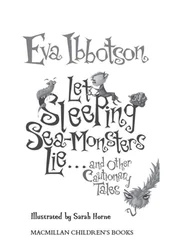‘After you’d saved your wife and the twins,’ said Maia.
He looked up sharply. ‘Eh? Yes. Yes of course; that goes without saying. Now, what was it you wanted?’
‘Miss Minton wondered whether you might have a map or a chart of the country round the house. It’s just to borrow for a little while.’
Mr Carter sighed, but he got up and began to rummage in a number of drawers. ‘Here you are,’ he said, returning with a rolled-up chart. ‘It covers ten square miles behind the house. Bring it back.’
Maia thanked him and left. She had never seen such a sad room or such a sad hobby.
But the map was interesting. She took it to her room and waited till evening when Miss Minton came to do what she called ‘hearing Maia read’. Since Maia had read fluently since she was six years old, this mostly meant asking Maia what she thought of David Copperfield or arguing with her about sentimental poems which Maia liked, and Miss Minton didn’t.
‘Look — I’ve been trying to copy this, but it’s difficult. Would you believe there are so many little rivers and streams and channels behind the house?’
Miss Minton bent to look. ‘They’re called igapes ,’ she said, ‘and the Indians go up and down them in their canoes. Even the ones that seem to be choked with reeds are often navigable.’
‘It looks as though one could go to Manaus the back way — not down the main river, if one had a canoe.’
‘And if one knew the way,’ said Miss Minton, looking at the maze of little waterways.
After she left, Maia again climbed onto the chair and looked out to the huts at the back. She had found out how to loosen the netting nailed over the window, and so could undo the catch. She knew the lullaby now that came from the middle hut where Tapi and Furo lived; sometimes she hummed it to herself in bed. And she was beginning to make out more and more people. The girl who had walked across the first night in her bright dress was called Conchita; her baby was a demon, always trying to wriggle out of her grasp, and the old lady in the middle hut who tended the chickens was Furo’s aunt…
But Blow the Wind Southerly , the tune she had heard someone whistle on the first night, never came again.
That Maia’s lessons were so interesting was a good thing because the twins went on being unfriendly and rude. Each day when she saw them in the fresh white dresses which Tapi’s young sister washed and ironed in a small steamy hut beside the boat house, she felt hopeful. The fair girls, their pretty dresses, their pink and blue ribbons, seemed to belong to the twins she had imagined before she came.
But the girls lived strange lives inside the dark and stuffy house.
Like those pale insect grubs that exist only to be fed and groomed by others, the twins ordered the servants to comb their hair, pick up their handkerchiefs, iron their hair ribbons… They never went anywhere alone, following each other even to the bathroom, and when they shook their heads or nodded they moved absolutely together as though they were puppets pulled by the same string. Yet one did not get the feeling that they were particularly fond of each other — or indeed of anyone or anything else.
As for Maia, the girls never lost a chance of snubbing her or making her feel unwanted. Mostly it was just words, but sometimes, when no one was there, they pushed her against the roughcast wall of the corridor, or dug their elbows into her. It was a long time since Maia had thought that Gwendolyn’s pinch that first day had been an accident.
‘Why do they hate me, Minty?’ she asked, bewildered. ‘What have I done to them?’
And always Miss Minton answered, ‘They’re not used to other girls yet. Give them time.’
Then at the beginning of the following week, they went into Manaus.
‘Perhaps Maia may prefer to stay behind and rest,’ suggested Mrs Carter hopefully.
‘Oh no. Please!’
‘Mr Murray has made it clear that Maia is to have dancing lessons and music lessons also,’ said Miss Minton firmly.
Since the twins’ lessons were being paid for by the money Maia had brought, there was nothing Mrs Carter could do.
They travelled down the Negro in the same dark green launch as had brought them from the ship. Mrs Carter and the twins sat in the cabin with the doors and windows shut, Maia and Miss Minton sat on deck.
‘Your hair’ll get all messy,’ said Beatrice.
But Maia needed to feel the wind on her face. She felt as if she had been in prison for a week.
Though they had docked there, Maia had not really seen the city. Now, as they drove from the harbour in a cab drawn by an old horse in a sunhat, she was amazed by the beauty and elegance of Manaus.
They drove past mansions painted in every colour: pink and ochre and blue, with flowers tumbling from window boxes. In the gardens surrounding them were blossoming orange and lemon trees, and mangoes, and wonderful creepers climbing over the railings. They passed two churches, a museum, a little park with a bandstand and a children’s playground. Everywhere were busy people: black women carrying baskets on their heads, Indian women with babies on their hips, messenger boys, smartly dressed Europeans, and nuns ferrying lines of little children.
And on the far side of a huge square, paved in swirling mosaics, stood a magnificent building roofed in tiles of green and gold, with the eagle of Brazil in precious stones soaring over the top.
‘Oh look!’ said Maia. ‘The theatre! Isn’t it beautiful! That’s where Clovis is going to act. The boy we met on the boat.’
‘We’re going there later to pick up our tickets,’ said Beatrice.
‘We’re going to see Little Lord Fauntleroy ,’ said Gwendolyn.
‘Oh good!’ said Maia innocently. ‘That’s the play he’s got the lead in.’
The twins looked at each other, but they said nothing then.
They drove down a street of elegant shops: dress shops and shoe shops, saddlers and hat-makers. It was incredible, this luxury a thousand miles from the mouth of the river. There seemed to be everything here that one could find in Europe.
The dress shops excited the twins; they leant out of the cab, peering and arguing.
‘Fleurette’s still got that polka dot muslin in the window. Can we go in, Mummy? You said we could shop properly this month. Can we have new dresses?’
Mrs Carter nodded. She would be able to pay off the money she owed Fleurette. Well not all of it; she owed money everywhere and Maia’s allowance would have to be doled out carefully. Fortunately Maia herself wouldn’t need new clothes for a long time. The child was dressed very plainly, she thought, looking at Maia’s blue poplin skirt and white blouse, but the materials were good.
But first they stopped at Madame Duchamp’s Academy of Dance.
Madame Duchamp was a French woman who had the wit to understand that the wealthy rubber growers and merchants who had come to Manaus wanted to make sure that their children missed nothing they could have had in Europe. So she ran classes in ballroom dancing, folk dancing, ballet…
The class the twins went to was a mixed one for both boys and girls. There were children of all nationalities: Russian, English, French and of course Brazilian — some pure Portuguese, some of mixed race; Indian with Portuguese, black with Indian, for the people of Brazil had intermarried for centuries and were proud of their mixed blood.
Maia changed quickly into her dancing shoes and turned round to see the twins sitting side by side on a locker, their plump legs sticking out in front, waiting for Miss Minton to come and help them.
‘Miss Porterhouse always put on our shoes and tied up our hair,’ said Beatrice.
‘So did Miss Chisholm,’ said Gwendolyn.
Читать дальше












